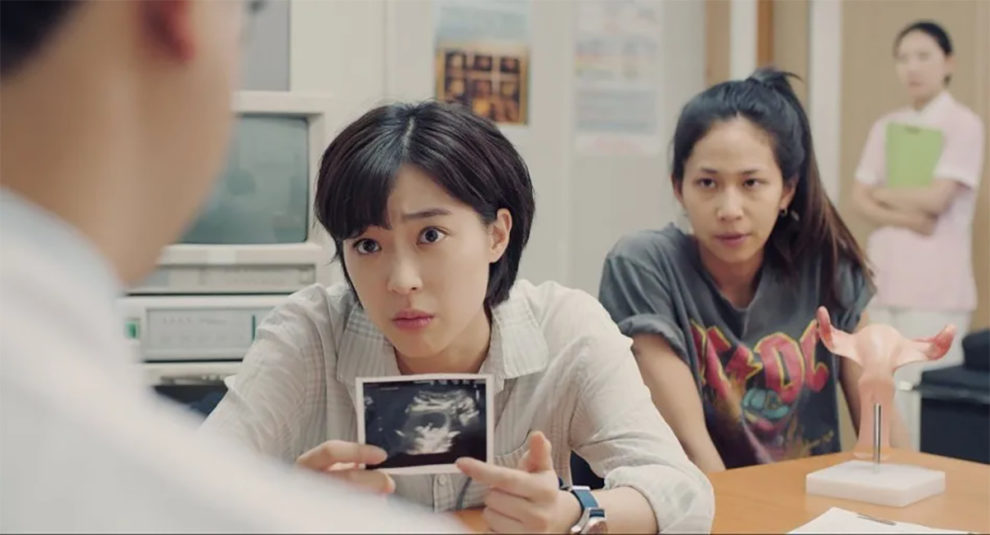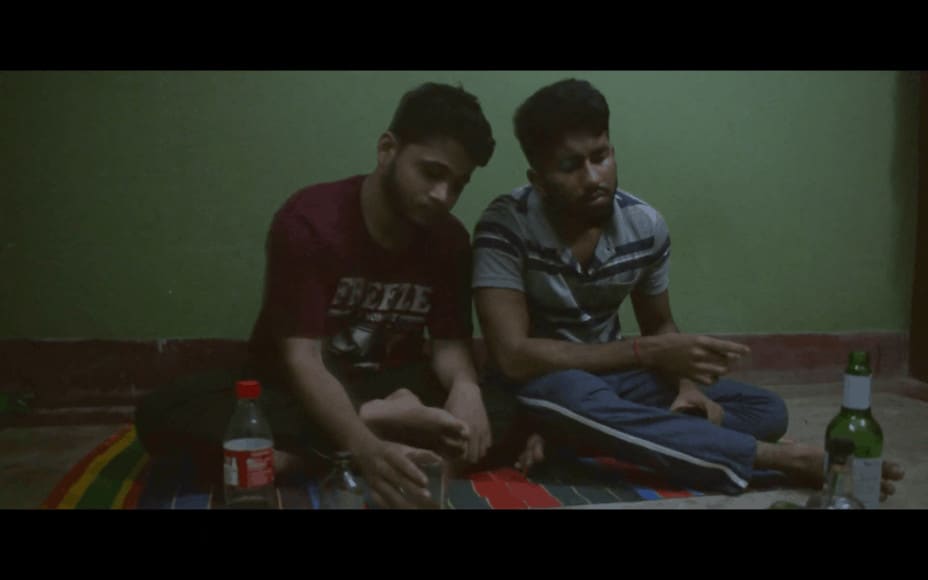An inspired and resolute debut for Korean Director Namkoong Sun, “Ten Months” illustrates the disproportionate burdens that an unwanted pregnancy lays on women, and the lack of options affecting the lives involved in it. So far “Ten Months” has earned 2 nominations at the Hawaii International Film Festival 2021 and the New York Asian Film Festival 2021.

In a sweltering hot Korean summer, 29-yer-old Mi-rae (Choi Sung-eun) is looking for reasons for her sickness. A never-ending hangover? Acid reflux? Liver problems? The bewildered pharmacist is surprised Mi-rae cannot see the obvious: she must be pregnant. It takes her 15 pregnancy tests to understand that “might” be the case, although she cannot fathom how it could have possibly happened. Denial is still strongly in place, even when Doctor Ong Joong (Baek Hyun-jin) shows her an ultrasound print out: “could that dot inside me be an alien intrusion?” Not as shocked as Mi-rae is Yoon-Ho (Seo Young-joo), her boyfriend who reminds her they had sex when drunk, after a party, so it certainly is not an alien that is growing inside her. Moreover, Yoon-Ho seems very pleased and positive about it.
Once the fact has sunk in, Mi-rae gradually starts to realize the effect it will have on her life. She is a brilliant game engineer for a small startup and it's unlikely she would be granted the right to take maternity leave; she has also never planned or considered getting married with Yoon-Ho and in a country where single mothers are still a bit of a social outcast, she will probably be pushed towards a rush decision. And, to top it up, in Korea abortion is considered a criminal offence, except for serious illness, rape or incest. No wonder this unexpected pregnancy throws her in a downward spiral of chaos. Too many decisions to make and Mi-rae is not ready for it. But who wood?
Namkoong Sun writes, directs and edits a film that illustrates with rare clarity, pathos and insight what an unplanned pregnancy can mean to a young and modern woman in a society that is not ready to support such a contingency outside the traditional patriarchal family & career framework. Korean culture has been moving fast, young people are propelled ahead, in their work and in their private life, women like Mi-rae can have fulfilling and rewarding jobs, and manage modern, egalitarian relationships. However, when maternity enters the picture, everything changes. What can look like Mi-rae's chronic indecision and inability to make sensible choices is a direct consequence of that lack of a supporting system in place.
“Ten Months” starts as a comedy, a genre that has often used the unplanned pregnancy as a comedic tool or a story twist, and in fact, its funniest moments stem from Mi-rae's stubborn denial at the beginning. However, it gradually shifts tone, in favor of a very compelling account of the protagonist's struggle. In doing so, it also brings up a series of social commentaries and critiques.
Despite not centering the film on this matter, abortion and the criminalization of it is one of the director's remarks, at least to emphasize that some choices weren't even available to Mi-rae. Another sore point is the patriarchal family setting and the obligation of getting married because of the pregnancy, together with the idea that women marry “into” the husband's family. It is with a dose of dark humor that the director comments on this particular subject, embodied in Yoon-hoo's imposing father and subservient mother. His father cannot stop treating Yoon-hoo like a loser, mainly because he wanted to follow his product designer aspirations instead of working in the family pig farm, and this accidental pregnancy-come-wedding is the father's leverage to force him back to work in the family business. So, in the end, Mi-rae's condition is deeply affecting her boyfriend's life choices also, although Yoon-hoo has far more unresolved frustrations and issues to be able to face the situation.
Mi-rae's dad wasn't happy either with his daughter's work choice (he calls it “odd stuff”) and would have preferred her securing a “safe” job in a big company. Ironically, Mi-rae will have to admit that maybe he was right, when, in one of the most irritating scenes of the film, she loses her job due to her unreliability in the future months, dismissed by her infuriating passive-aggressive boss. And yes, male characters don't look great at all in “Ten Months”; with the exception of the kind-but-matter-of-fact doctor, they just don't have a clue. In contrast, Mi-rae gets a little bit of moral support from her girlfriends, even if an emotional encounter with one of them casts a glance over the ghost of postnatal depression. Not last, a tongue in cheek critique is done with sense of humor regarding the lack of sex education (although Mi-rae's stupor at her pregnancy is mainly due to a total absentmindedness) and to the drink culture as a major factor in unwanted pregnancies in Korea, and many other countries!

Photography and direction are of the naturalistic kind you often see in indie films and the jazzy score follows suit. It is the accomplished and dynamic editing that keeps everything nicely together, giving the film an uplifting pace even in the most dramatic parts. Choi Sung-eun does a wonderful job in portraying the struggle and the deep transformation that Mi-rae goes through, the indecision, the fear, the rage, her tomboyish attitude and her fragility. She is a brilliant professional and deserves a bright career. All the other parts are supporting and minor but all good, from Seo Young-joo, her immature boyfriend to Baek Hyun-jin, the kind doctor and Yoo Yi-deun and Kwon A-reum as her girlfriends Kim-Kim and Kang-Mi.
By the time the film was completed, something important had changed in Korea. In April 2019, the majority of the Constitutional Court of Korea ruled that the criminalization of abortion was unconstitutional and consequently, in October 2020, it was announced that a bill would be drafted to decriminalise abortion up to 14 weeks into a pregnancy. But “Ten Months” is still one of the most honest accounts, together with Kim Do-Young's “Kim Ji-young: Born 1982”, of what means for a woman not having control over her own body and her own life. A bold first feature for Namkoong Sun; I cannot wait for what comes next.
















